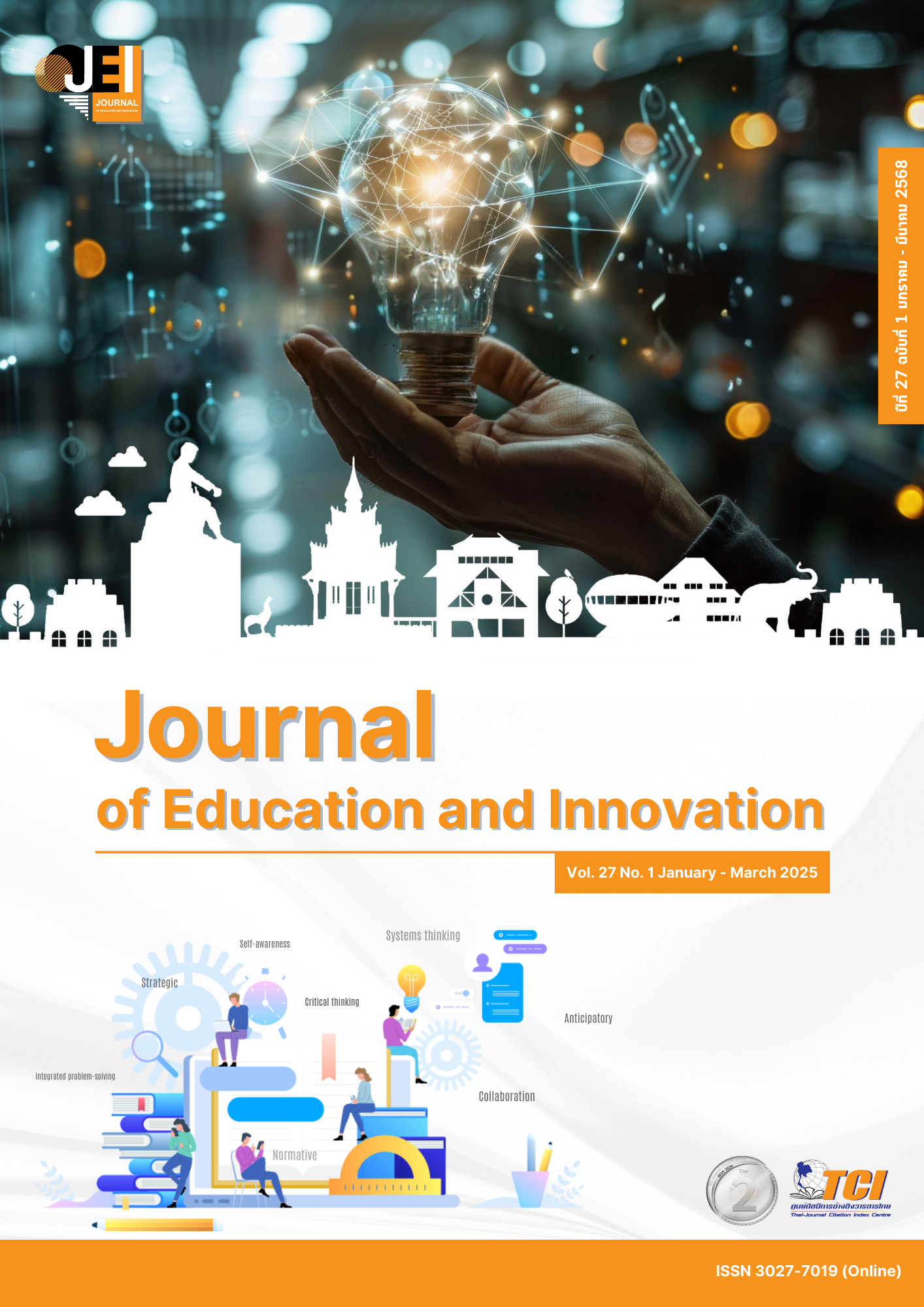NATURE LOST: IMPACTS AND RESTORATION STRATEGIES FOR EARLY CHILDHOOD IN THE DIGITAL AGE
Main Article Content
Abstract
The exploration of the impact of the digital age on early childhood, particularly the lack of nature, which may lead to developmental issues, has shown through the study of fundamental principles, concepts, and various research, the great importance of nature in the learning and development process of young children. The disappearance of nature in the current era is attributed to parents, guardians, and educational institutions placing excessive importance on the use of digital technology. This has led to an imbalance in daily activities, which rely heavily on digital technology at all times. Therefore, there is a need for collaboration to address, support, and develop the impact and methods of restoration for young children in the digital age. This involves balancing their lives with a conscious use of digital technology and integrating restorative methods that emphasize free play and learning from nature, to holistically strengthen the development of young children in the digital age.
Article Details

This work is licensed under a Creative Commons Attribution-NonCommercial-NoDerivatives 4.0 International License.
The owner of the article does not copy or violate any of its copyright. If any copyright infringement occurs or prosecution, in any case, the Editorial Board is not involved in all the rights to the owner of the article to be performed.
References
Allen Cooper National Wildlife Federation. (2015). Nature and the Outdoor Learning Environment: The Forgotten Resource in Early Childhood Education. International Journal of Early Childhood Environmental Education, 3(1), 85-97.
Amarin Baby & Kids. (2021). Thai children at risk of nature deficit disorder, trapped in a virtual world. Retrieved from https://www.amarinbabyandkids.com/tips-for-parents/children-nature-deficit-disorder/
Anawatsiriwong, T., & Anawatsiriwong, P. (2018). MIDL for kids: Media and digital literacy for early childhood. Bangkok: Superior Printing House.
Athanupan, M, L. (2018). Growing Plants and Growing Children: The gardening activity for young children. Veridian E-Journal, Silpakorn University, 11(3), 177-191.
Câmpan, A. S., & Bocos, M. (2019). The Outdoor Activities in Preschool Education. In V. Chis, & I. Albulescu (Eds.), Education, Reflection, Development –ERD 2018, vol 63. European Proceedings of Social and Behavioral Sciences (pp. 1-6). Future Academy. DOI: 10.15405/epsbs.2019.06.1
Casey, T. (2020). Play to Build a Happy World: Guidelines for Organizing Play Environments for Children (Translated by Nareumol Ruenwai). Pathum Thani: Walk on Cloud.
Chueasataphonsiri, T. (2022). “Transparent screens”: A threat to the development and behavior of children in the digital age. Retrieved from https://op.mahidol.ac.th/ga/posttoday-45
Jakkham, T., Intasing, S., & Suwatanan, S. (2023). Development of local identity integrated learning unit to promote creative thinking ability and sustainable coexistence with nature and science competency for grade 4 students. Chiang Mai University Journal of Curriculum and Teaching, 2(2), 26-39.
Kerdplang, P. (2011). The Results of Using a Project-Based Experience Activity Set Based on the Sufficiency Economy Concept for Early Childhood (Master thesis). Bangkok: Rajamangala University of Technology Thanyaburi.
Martha, C. M., & Marianne, E. K. (2016). Across the Spectrum: Resources for Environmental Educators. Retrieved from https://dg56ycbvljkqr.cloudfront.net/sites/default/files/eepro-post-files/acrossthespectrum_8-1-16.pdf
Office of the Education Council Secretariat, Ministry of Education. (2020). Guidelines for the development of learning resources in the digital era appropriate for early childhood learners. Retrieved from http://www.sesalpglpn.go.th/wp-content/uploads/2021/05/book43-64.pdf
Pantuworakul, K., & Nuansri, M. (2019). Young children as digital citizens: Opportunity or risk. Journal of Education Studies, 47(2), 1-23.
Petchruanthong, S., & Tatsamai, K. (2023). Early childhood development through learning from eco-gardens: Health promotion media for early childhood in families and communities. Retrieved from https://www.thaihealth.or.th/?p=349744
Phitaksinsuk, T. (2019). The effects of early childhood education crisis on Thailand’s future. Journal of Early Childhood Education Management, 1(1), 77-89.
Pholittponkarnpim, A. (2021). Thai children at risk of illness from nature deficit disorder, trapped in a virtual world. Retrieved from https://www.amarinbabyandkids.com/tips-for-parents/children-nature-deficit-disorder/
Rahima Baldwin Dancy. (2005). You Are Your Child’s First Teacher [Translated by Suwanna Chokprachakchad]. Bangkok: SE-EDUCATION.
Ratana, P. (2021). Early childhood education management for citizenship in the digital world: Lessons from abroad. Journal of Social Research and Development, 3(4), 1-23.
Rogow, F. (2002). ABCs of media literacy: What can preschoolers learn? Retrieved from www.medialit.org/reading-room/abcs-media-literacy-what-can-pre-schooolers-learn
Sangmala, N., Charoensub, T., Uarsakchai, S., & Moosikajaroen, W. (2024). The Trend of Critical Thinking. Journal of Roi Kaensarn Academi, 9(4), 838-853.
Sithisoman, S. (2017). A study on the management of digital media for early childhood (Doctoral dissertation). Nakhon Pathom: Silpakorn University.
Sokampa, A. (2023). Best practice performance for early childhood teachers: Nature-based learning. Retrieved from http://innodev.moe.go.th/document/innovation-100.pdf
Srichanchai, J., & Tilakarayasrup, S. (2021). The effect of smartphone usage in early childhood: Nursing role. Journal of MCU Nakhondhat, 8(10), 113-124.
Suthiprapa S., Hiruncholotorn P., & Butrakattanyu O. (2022). Effect on environmental awareness among early childhood children through the introduction of an activity set under “Knowledge of Environmental Conservation among preschool children”. Journal of Educational Innovation and Research, 6(2), 352-365.
Tatsutaka, Y. (2021). Nature Deficiency Disorder [Translated by Atiporn Borinayakanon]. Bangkok: Foundation for Children with Disabilities.
Thai Health Promotion Foundation (ThaiHealth). (2020). Policy on 'Early Childhood' Sparks a Call for Solutions to Overhaul Childcare Systems for the 21st Century. Thai Post. Retrieved from https://www.thaipost.net/main/detail/83767
Thai Health Promotion Foundation (ThaiHealth). (2020). Self-Reliant Health Promotion Guide for the New Normal: Recommendations for Achieving Good Health Starting from Oneself and Daily Life. Retrieved from https://www.thaipost.net/main/detail/83767
The Department of Health. (2018). Progress Report on the Indicators of Thai Children's Growth and Age-Appropriate Development. Retrieved from https://nich.anamai.moph.go.th/th/general-of-50/204371.
Udomrati, W. (2022). Developing knowledge to promote and restore the development of early childhood after the COVID-19 pandemic. Retrieved from https://ecd-covidrecovery.rlg-ef.com/learning-loss2-95/
Yamrung, R., Suthasinobol, K., & Jantraphirom, P. (2022). The age of change and challenges in childhood development. Journal of Home Economics, 65(2), 1-13.
Yenjabok, P., & Thammanitayakul, C. (2020). “The Round World Called Digital” Handbook. Bangkok: Safe and Creative Media Development Fund.


